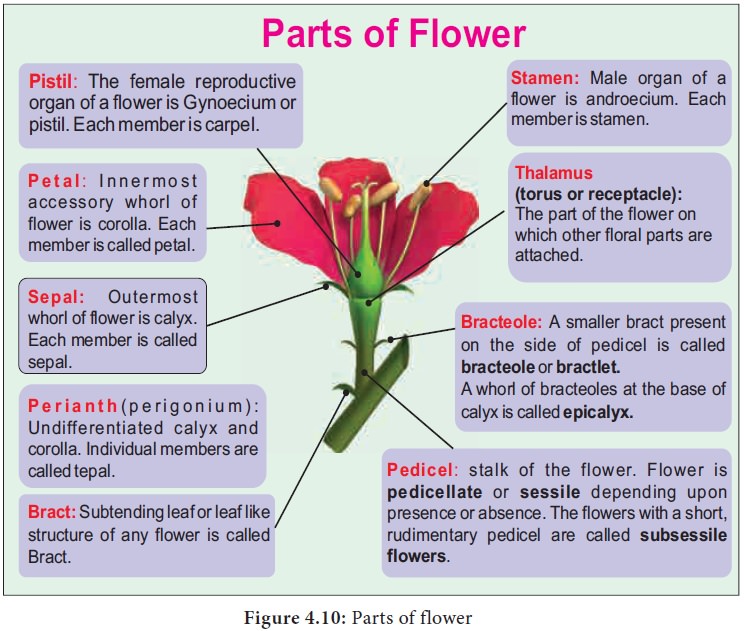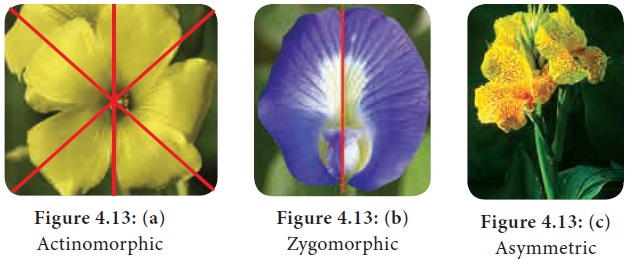Chapter: 11th Botany : Chapter 4 : Reproductive Morphology of Angiosperm
Flower and Parts of flower
![]()
![]()
![]() Flower
Flower
In a plant, which part would you like the most? Of
course, it is a flower, because of its colour and fragrance. The flower is a
significant diagnostic feature of angiosperms. It is a modified condensed
reproductive shoot. The growth of the flower shoot is determinate.

1. Whorls of flower
There are two whorls, accessory and essential. Accessory whorl consists of calyx and corolla and essential whorl comprises of androecium and gynoecium.
Flower is said to be Complete when it contains all four whorls. An Incomplete flower is devoid of one or more whorls.


2. Flower sex
Flower
sex refers to
the presence or absence of
androecium and gynoecium within a flower.
1.
Perfect or bisexual(monoclinous): When a flower contains both
androecium and gynoecium is called perfect
flower.
2.
Imperfect or unisexual (diclinous): When the flower contains only one
of the essential whorls is called Imperfect
flower. It is of two types:
i)
Staminate flowers: Flowers only with androecium alone are called staminate
flowers.
ii)
Pistillate flowers: Flowers with only gynoecium are called pistillate
flowers.

3. Plant sex
Plant sex
refers to
the presence and distribution of
flowers with different sexes in an individual plant.
1 Hermaphroditic: All the flowers of the plant are bisexual.
2 Monoecious (mono-one; oikos-house): Both male and female flowers are present in the same plant
Example: Coconut.
3
Dioecious
(di-two: oikos-house): Male and Female flowers are present on
separate plants. Example: Papaya, Palmyra.
4
Polygamous: The
condition in which bisexual and
unisexual (staminate/ pistillate) flowers occur in a same plant is called polygamous. It is of several types. See
box. Example: Musa, Mangifera.
Types of Polygamous:
Andromonoecious: A plant with both male flowers and bisexual flowers.
Gynomonoecious: A plant with both pistillate and bisexual flowers.
Polygamomonoecious: A plant with pistillate, staminate and
bisexual flowers. It is also called trimonoecious.
Androdioecious: A plant with staminate flowers on one individual
and bisexual flower on other individual
Gynodioecious: A plant with pistillate flowers on one individual
and bisexual flowers on other individual.
Polygamodioecious: A plant with staminate flowers and bisexual in one
individual and pistillate flowers and bisexual flowers in other individual.
Trioecious: A plant with staminate,pistillate and bisexual flowers on different individuals
4. Flower symmetry
What is the radius of a circle? Cut a paper into round shape, fold it so as to get two equal halves. In how many planes will you get equal halves? In how many planes you can divide a cucumber in two equal halves? A flower is symmetrical when it is divided into equal halves in any plane running through the center. Flower symmetry is an important structural adaptation related to pollination systems.
1.
Actinomorphic (or) radial or polysymmetric: The flower shows two mirror images when cut in any plane or
radius through the centre.Normally there are more than two planes of symmetry.
Example: Hibiscus, Datura, water
lily.
2.
Zygomorphic (bilateral symmetry) or monosymmetric: The
flower can be divided into equal halves in only one plane. Zygomorphic flower
can efficiently transfer pollen grains to
visiting pollinators. Example: Pisum,
Bean, Cassia, Gulmohar, Salvia, Ocimum.
3.
Asymmetric (amorphic): Flower lacks
any plane of symmetry and cannot be divided into equal halves in any plane.
Parts of such flowers are twisted. Example: Canna
indica.
Related Topics